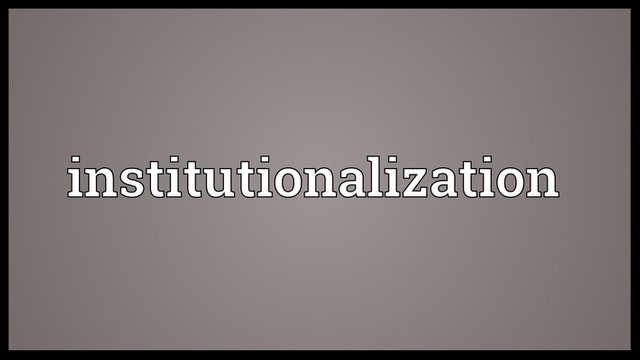The relevance of structures is where institutionalization depended on
The relevance of structures is where institutionalization depended on

Image Source
It might be heuristically helpful to think here as far as perfect regular extremes. It is conceivable to consider a general public in which institutionalization is total. In such a general public, all issues are normal, all answers for these issues are socially objectivated and every single social action are institutionalized. The institutional order grasps the totality of social life, which takes after the consistent execution of a complex, very adapted formality.
There is no specific appropriation roles of knowledge, or almost none, since all roles are performed inside circumstances of equivalent pertinence to every one of the actors. This heuristic model of a totally institutionalized society can be marginally changed by considering that every social action are institutionalized, however not just around normal issues.
While the style of life such a general public would force on its individuals would be similarly unbending, there would be a more noteworthy level of role-specific circulation of knowledge. Various formalities would go ahead in the meantime. Neither the model of institutional totality nor its adjustment can be found ever.
Real social orders can be considered as far as their estimate to this outrageous sort. It is then conceivable to state that crude social orders estimated the sort to a significantly higher degree than edified ones. It might even be said that in the improvement of archaic civilizations there is a dynamic development far from this compose.

Image Source
The contrary extraordinary would be a general public in which there is just a single normal issue, and institutionalization happens just regarding actions worried about this issue. In such a general public there would be no normal stock of knowledge. All knowledge would be role-specific. As far as naturally visible social orders, even approximations of this write are truly inaccessible.
Certain approximations can be found in littler social developments - for instance, in libertarian colonies where regular concerns are restricted to economic courses of action, or in military endeavors comprising of various ancestral or ethnic units whose lone normal issue is the pursuing of the war.
Aside from animating sociological dreams, such heuristic fictions are valuable just in so far as they help to clear up the conditions that support approximations to them. The most general condition is the level of division oflabor, with the attending separation of institutions. Any general public in which there is expanding division of labor is moving far from the principal extraordinary compose depicted previously.
Another general condition, firmly identified with the past one, is accessibility of an economic overflow, which makes it feasible for specific people or gatherings to participate in particular exercises not straightforwardly worried about subsistence. These specific exercises, as we have seen, prompt specialization and division in the basic stock of knowledge.

Image Source
What's more, the last makes conceivable knowledge subjectively isolates from any social importance, that is, unadulterated hypothesis. This implies certain people are liberated from hunting to fashion weapons as well as to manufacture myths.
Therefore we have the hypothetical life, with its extravagant proliferation of particular collections of knowledge, directed by authorities whose social distinction may really rely on their powerlessness to do anything aside from conjecture - which prompts various systematic issues.
Institutionalization isn't an irreversible procedure, regardless of the way that institutions, once shaped, tend to continue. For an assortment of authentic reasons, the extent of institutionalized actions may lessen, deinstitutionalization may occur in specific regions of social life. The private circle that has risen in present day modern culture is extensively deinstitutionalized when contrasted with the general population.

Image Source
References:
Knowledge Society
Sociological Theorists: Alfred Schutz
The role of education in the knowledge-based society
What language is this written in? I want to contribute as a Union member, community leader and advocate but I can not make out what you are trying to say.
You have used words that don't capture what you're trying to say.
Perhaps write in your native tounge and get someone to translate it.
No offence but, this is unlegible.
nice post. i like your post to much thanks
for sharing post
This post that enlighte, i am work in the institution as you mean above I see the paradigm that develops sometimes difficult in the fox. there is a certain stigma that becomes an institutional mission. I think with this post can be enlightening. good post
thank you for giving me new knowledge.
regards
thank you for your post, I think I get the general Gist of it.
❤ up-voted and followed! ~ Share the love! ❤